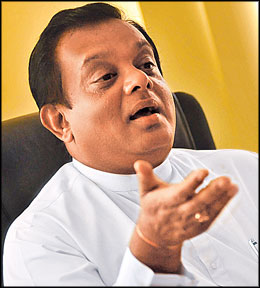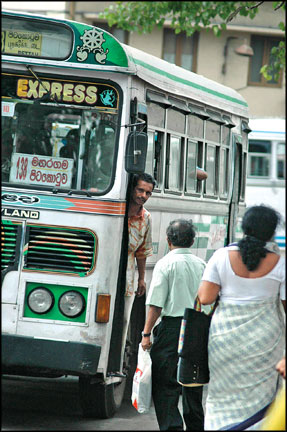Private bus service will be streamlined - Minister
By Ranil WIJAYAPALA
|

C.B. Ratnayake
|
The private bus transport service in this country is one of the most
closest services to the public. It is also the most criticised. People
tolerate all inconveniences and the rudeness of bus crews since it is
the most sought after transport service. For the first time in Sri
Lanka’s history, a Minister for Private Transport Services was appointed
by President Mahinda Rajapaksa considering the impact of this sector to
the general public.
C.B. Ratnayake hailing from the district of Nuwara Eliya was
appointed as Minister of Private Transport Services at the last Cabinet
reshuffle. In an exclusive interview with the Sunday Observer at a time
when a 7.6 percent bus fare hike is to be implemented and also in the
wake of threats by the Lanka Private Bus Owners Association, Minister
Ratnayake explained his future plans to streamline the private bus
service which represents 70 percent of the bus transportation in the
country.
The Minister emphasised the need to have a National Policy for the
private transport sector if the country needs to have qualitative
improvement in the private bus service.
Excerpts of the interview:
Q: A decision has been taken to increase bus fares by 7.6
percent with effect from July 1. Why is a fare hike needed at this
point?
A: Bus fares were not revised for the last two years. The
price of diesel, fuel, tyres and spares and salaries have increased
significantly. Therefore the increase is necessary. According to the
National Transport Policy bus fares could be revised once a year if
there are sufficient factors to do so on the request of the bus
operators. This year, considering the expenses that have to be borne by
the bus operators, after months of long discussions with the private bus
operators’ associations we decided to increase fares by 7.6 percent
without inconveniencing commuters and also bus owners and operators.
Q: But the Lanka Private Bus Owners Association seems to be
unhappy with the increase and threatens to launch a strike if the
Ministry failed to heed their demand ?

|
A: We took the decision to increase the bus fare by 7.6
percent after discussing with all the private bus operators
associations. The association which has threatened to launch a strike
was also among them. They have participated at two rounds of talks and
my Ministry Secretary participated in those discussions. They withdrew
from the discussions saying that they had to attend an emergency. The
particular individual representing one association was of the opinion
that the Transport Ministry and the National Transport Commission should
take a decision on the bus fare hike after discussing only with them.
They think that other bus owners associations do not have active
membership and have no say in the private bus industry. If a
legitimately elected government takes a threat of an individual
seriously that would be a joke. We do not take his threat seriously.
Q: What action would you take if that Private Bus Owners
Association launched an islandwide strike ?
A: I do not care about its threat and would consider it a
minor accident in which one vehicle slightly touches the other. I
request people not to panic due to a strike threat and attend their
daily activities as usual. Send your children to school. Attend office
and work as usual. The bus services will be operated as usual as all
other bus owners associations have agreed to operate their buses without
disruption along with the Sri Lanka Transport Board buses.
Q: There is a complaint from commuters that though bus fares
are revised annually there is no qualitative improvement in the private
bus services. What kind of program do you have in mind for a qualitative
improvement in the private bus service?
A: That is true. But we have to recall how this bus service
originated before we find out solutions. Bus services commenced during
the colonial era to provide transport to the farmers, labourers and
other villagers. Buses started plying on roads in which carts were
plying. Those bus services were operated by people like ‘Nodi Kule’ and
‘Chandi Abey’.
They settled problematic situations by thuggery as they had a
monopoly. Peoplising private bus services was during Prime Minister
S.W.R.D. Bandaranaike’s time to provide a better service. The Ceylon
Transport Board (CTB) was formed to provide public transport facilities.
People like Anil Moonesinghe rendered yeoman service to the CTB to run
it as a people friendly service. But with the changes of governments,
the CTB became a burden with excessive numbers of employees and enormous
expenses to maintain it as a public sector institute. Under SLFP
governments it received due recognition and people were properly trained
for maximum service. But, in the UNP reign after 1977 the CTB was put
under separate management. With the introduction of the open economy
private bus services also came into effect and those who had political
and physical power ran the service like selling commodities in a public
fair. They deploy buses to the road and they run those services as they
wish.
Private bus services were put under the Provincial Councils with the
introduction of the Provincial Council system in 1987. The National
Transport Commission (NTC) was established to streamline the service.
They could bring about positive changes in the private bus service. But
still there are some elements like indisciplined drivers and conductors,
bus owners and extortionists; the Commission could not tackle. I, as the
Private Sector Transport Minister, have undertaken the responsibility of
further streamlining the private sector bus service. We will take action
within the next months to control those unruly elements by enforcing new
laws and formulating new policies. We expect to ensure a dignified life
for the private bus crew, to protect bus owners and also to provide a
qualitative bus service for commuters.
Q: Private buses are running only with the purpose of profit
making. Most of the short distance private bus operators are not willing
to operate the night hours. How do you intend making it a more people
friendly service?
A: Firstly, I have to say the private sector bus services
cannot be run without making profits. When we visit private hospitals,
they charge us for each and every service they provide unlike government
hospitals. Private buses generate huge revenue to the Government
Treasury. No one is talking about it. Earlier private buses had only a
30 percent share in the bus service. Now it has increased to 70 percent.
They are obtaining licences, paying taxes, paying Provincial Transport
Authorities and the NTC. There are more than 150,000 people depending on
this service. We are trying our best to enforce laws with regard to
issue of tickets, display of bus fares, and to transform these bus
drivers and conductors to a disciplined set. We are enforcing laws to
cancel their route permits and licences if they do not follow these
rules.
Q: Private bus drivers and conductors work as temporary hands.
There is no guarantee for their jobs. Do you have a program to address
their grievances?
A: We are working out a program to ensure better working
conditions for bus crews. It will include provision of EPF and ETF and a
pension. We will empower them providing them with better working
conditions and job guarantees.
Q: Some semi-luxury, luxury and super luxury buses run without
adhering to the stipulated standards just to charge additional bus fare
from the commuters. How is this to be tackled?
A: We have identified that problem too. Some private buses are
violating normal rules after pasting huge stickers of popular
politicians on their buses. We are closely following those trends within
the private bus sector and taking action to prevent them breaking rules.
We are trying to introduce a new colour system for the normal bus
service, semi-luxury, luxury and super luxury bus services for easy
identification.
We are taking action to remove stickers of politicians on private
buses as we think it is not correct. Private bus operators violating
normal road rules under cover of these stickers.
Q: What steps will you take to improve facilities for
commuters at bus stands?
A: 25 District National Transport Commission offices and new
bus stands will be opened which are equipped with all modern facilities
and digital technology in collaboration with the Provincial Transport
Ministries. These bus stands will also be provided with resting places
for the commuters and also clean toilets. We have also introduced seat
booking facilities after dialling number 4444.
Q: There is huge political interference in the process of
issuing route permits for the profit-making bus routes. What action will
you take to avoid such situations?
A: This is a subject under Provincial Councils. There are
around 20,000 private buses operating in Sri Lanka and 40,000 bus
drivers and conductors, around 20,000 bus owners and another 60,000
people depending on them. Altogether 125,000 people depend on this
service. Sometimes they are misguided by politicians to enforce illegal
ways to operate extorting money from private bus operators. We are
trying to minimise such interferences.
Q: The private bus transport system is mainly handled by the
Provincial Transport Ministries and Provincial Road Passenger Transport
Authorities. How are you going to tackle problems that arise due to this
situation?
A: Since this sector comes under Provincial Councils, this
subject was handled differently at the Central Government level and
Provincial level. They were running on two tracks.
What we are trying is to bring them together and run on one track. A
forum, where all the Provincial Chief Ministers, Provincial Transport
Ministers, Provincial Road Passenger Transport Authority Chairmen,
Transport Ministry Secretaries, National Transport Commission Chairman
and the Director Board were to work towards a better private bus service
in the country is to be formed.
Q: You emphasise that we should formulate a National Policy
for the private bus transport sector. What are your plans for this?
A: Yes, we should have a national policy to streamline the
private bus services in the country. I emphasise the need for this. I
may be the Minister incharge of the private bus service today and this
will be changed within a few years. We need to have a national policy
which should go beyond a 25-year period. We are undergoing rapid
development in the country in which cart roads are turning into
expressways and highways. We need to transform the transport sector into
a better one to go parallel with the development activities taking place
under the Mahinda Chinthana program.
We are working out national policy for the private bus sector to be
implemented by the year 2012. In the process of formulating the policy
contributions from the Executive, Legislature and the Judiciary will be
taken. The general public will be educated through its publication in
all three languages.
|

